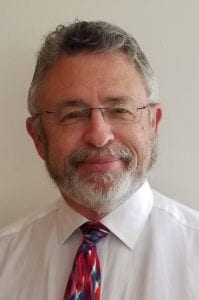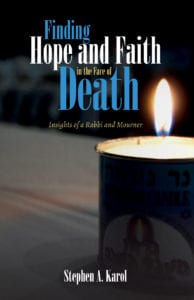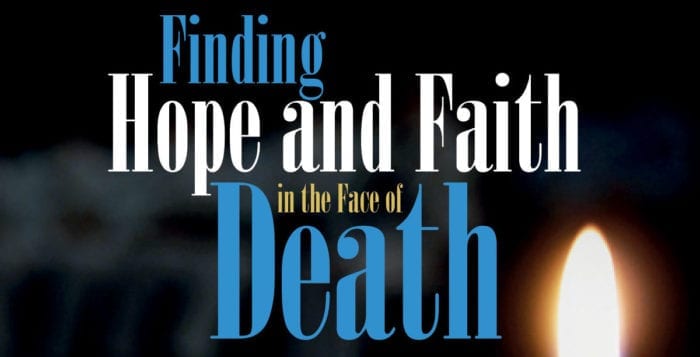By Donna Newman
One of the certainties of life is that, unless one departs first, sooner or later each of us will have to deal with the death of a loved one.
Among his many duties as a spiritual leader, Stephen Karol, now Rabbi Emeritus at Temple Isaiah in Stony Brook, has ministered to the bereaved. He has officiated at funerals, counseled families and helped people navigate the mourning period that begins upon a death and continues through memorial services throughout the ensuing years.
Rabbi Karol has gathered a series of memorial sermons into a book titled, “Finding Hope and Faith in the Face of Death” and subtitled, “Insights of a Rabbi and Mourner.”

What motivated you to write this book?
I decided to do it for a couple of reasons. First, I’ve gotten really good feedback on my Yizkor (memorial) sermons. People have asked for copies and that sort of thing. And, throughout my career officiating at funerals, I just think people need comforting, hopeful messages to help them cope with death. That’s what this book provides.
Is this a ‘Jewish’ book, or do you feel it has broader appeal?
The book is written primarily for Jews, but not exclusively. While I speak from a Jewish context, a lot of what I have to say in these messages can be applied to people who are Jewish or not, religious or not, whatever they may be.
Why publish it now?
As a congregational rabbi I was devoted to my congregants — and happily so — and didn’t have the time to write a book. Now, in retirement, I decided to share my words of comfort. And when I submitted my proposal to the publisher (Wipf and Stock), they loved my idea and enthusiastically agreed to publish it under their Cascade Books imprint.
What was the most challenging part of compiling the manuscript?
In creating the introduction to the book, I wanted to be honest. I had to confess that, despite my faith in life after death, I am afraid to die. So, I describe my fear and explain how it materialized at a particularly happy time in my life, shortly after my daughter’s birth. I tell about the ways I’ve learned to cope with it and describe how a combination of hope and faith have helped me not only as an individual but also as a rabbi. That’s why I think my words can be universal, because you don’t have to be a rabbi to believe what I believe, and to feel and think what I feel and think.
How did you choose the sermon that became Chapter 1?
The first chapter in the book was chosen because it dealt with a personal loss. I titled it, “Accompanying the Dead” and it begins: “My uncle Harry died last month.” I talk about the experience of being in my uncle’s hospital room with him when he died, and officiating — along with my brother who is also a rabbi — at his funeral. A good number of the chapters involve personal experiences.

Aside from your own personal losses over the years, did other experiences contribute to your understanding of life and death?
I suffered a heart attack in 1995 that gave me a greater sense of perspective. One of the messages in the book is that we need to value life and make every day count. We need to tell people that we love them whenever we can.
How long was this book in the making?
The book consists of 16 sermons that I have given both at Temple Isaiah and at Congregation Sha’aray Shalom in Hingham, Massachusetts, over the course of my tenures at both synagogues. So, when people ask me how long it took to write the book, tongue in cheek I say: 35 years.
“Finding Hope and Faith in the Face of Death” is currently available for purchase on Amazon, Kindle and Ingram. Meet Rabbi Karol at a book talk and signing on June 24 at Temple Isaiah, 1404 Stony Brook Road, Stony Brook from 5 to 7 p.m.; or at a book signing on June 28 at Barnes & Noble at the Smith Haven Mall in Lake Grove from 7 to 9 p.m.





